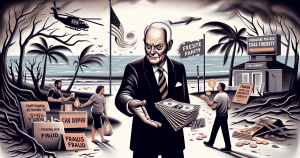On November 2, 2024, the Brazilian government announced a comprehensive overhaul of its casino licensing regulations, aimed at attracting foreign investment and boosting tourism in lesser-known regions of the country. The new framework, which will come into effect on January 1, 2025, focuses on sustainable development and includes strict guidelines to ensure that the economic benefits are felt across local communities.
Under the revised framework, licenses will be granted through a competitive bidding process, with a strong emphasis on environmental sustainability and community engagement. Successful applicants will be required to demonstrate how they will contribute to the local economy, including plans for hiring local workers, collaborating with local businesses, and promoting responsible gambling.
The decision comes after extensive consultations with stakeholders in the gambling and tourism industries, as well as community leaders. According to João Almeida, Minister of Tourism, “This new framework is designed to ensure that our expansion into the casino sector brings maximum benefits for all Brazilians, particularly in regions that have not traditionally benefited from tourism dollars.”
The government has identified several potential sites for new casinos, including in the Amazonas area and along the northeastern coast, areas that are popular with tourists but underdeveloped economically. The move has been welcomed by local business owners like Ricardo Souza, owner of a small hotel in Manaus. “The prospect of a casino opening here is incredible for businesses like mine. It will bring a new wave of visitors and with them, the opportunities for growth and improvement in our services.”
Critics, however, have raised concerns about the potential social impact of introducing more casinos, including issues related to gambling addiction and the effect on local cultures. In response, the government has pledged significant funds to support addiction treatment programs and cultural preservation initiatives. A portion of the tax revenue generated from the casinos will be allocated to these programs.
The new licensing program also includes measures to combat corruption, with an independent oversight committee set up to monitor the bidding process and the operations of the casinos once they are up and running. This committee will include members from law enforcement, the gambling industry, and community groups.
Industry analysts predict that the new casinos could generate up to $1 billion in tax revenue in the first five years, providing a significant boost to the Brazilian economy. The move is also expected to create thousands of jobs, from construction through to hospitality and management.
Slots developer PlayTech has already expressed interest in the Brazilian market, with CEO Alan Jackson commenting, “Brazil’s rich culture and untapped market potential make it an exciting prospect for us. We are particularly impressed with the government’s commitment to sustainable and responsible development.”
This overhaul signifies a major shift in policy for Brazil, which has been cautious in its approach to gambling for many years. With the potential for significant economic benefits and a framework designed to mitigate social risks, this could set a precedent for other countries in Latin America considering similar expansions into the gambling sector.
As Brazil gears up for this new chapter in its tourism and gambling industry, the world will be watching closely to see if it can balance economic growth with social responsibility, potentially transforming regions that have historically been overlooked in terms of development.

Garry Sputnim is a seasoned journalist and storyteller with over a decade of experience in the trenches of global news. With a keen eye for uncovering stories that resonate, Alex has reported from over 30 countries, bringing light to untold narratives and the human faces behind the headlines. Specializing in investigative journalism, Garry has a knack for technology and social justice issues, weaving compelling narratives that bridge tech and humanity. Outside the newsroom, Garry is an avid rock climber and podcast host, exploring stories of resilience and innovation.
















